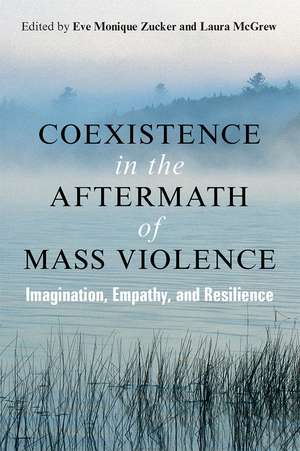Coexistence in the Aftermath of Mass Violence: Imagination, Empathy, and Resilience
Autor Eve Zucker, Laura McGrewen Limba Engleză Hardback – 7 dec 2020
Coexistence in the Aftermath of Mass Violence demonstrates how imagination, empathy, and resilience contribute to the processes of social repair after ethnic and political violence. Adding to the literature on transitional justice, peacebuilding, and the anthropology of violence and social repair, the authors show how these conceptual pathways—imagination, empathy and resilience—enhance recovery, coexistence, and sustainable peace. Coexistence (or reconciliation) is the underlying goal or condition desired after mass violence, enabling survivors to move forward with their lives. Imagination allows these survivors (victims, perpetrators, bystanders) to draw guidance and inspiration from their social and cultural imaginaries, to develop empathy, and to envision a future of peace and coexistence. Resilience emerges through periods of violence and its aftermaths through acts of survival, compassion, modes of rebuilding social worlds, and the establishment of a peaceful society.
Focusing on society at the grass roots level, the authors discuss the myriad and little understood processes of social repair that allow ruptured societies and communities to move toward a peaceful and stable future. The volume also illustrates some of the ways in which imagination, empathy, and resilience may contribute to the prevention of future violence and the authors conclude with a number of practical and policy recommendations. The cases include Cambodia, Rwanda, Sierra Leone, Somaliland, Colombia, the Southern Cone, Iraq, and Bosnia.
Focusing on society at the grass roots level, the authors discuss the myriad and little understood processes of social repair that allow ruptured societies and communities to move toward a peaceful and stable future. The volume also illustrates some of the ways in which imagination, empathy, and resilience may contribute to the prevention of future violence and the authors conclude with a number of practical and policy recommendations. The cases include Cambodia, Rwanda, Sierra Leone, Somaliland, Colombia, the Southern Cone, Iraq, and Bosnia.
Preț: 537.46 lei
Preț vechi: 663.54 lei
-19% Nou
Puncte Express: 806
Preț estimativ în valută:
102.86€ • 106.99$ • 84.91£
102.86€ • 106.99$ • 84.91£
Carte indisponibilă temporar
Doresc să fiu notificat când acest titlu va fi disponibil:
Se trimite...
Preluare comenzi: 021 569.72.76
Specificații
ISBN-13: 9780472074655
ISBN-10: 0472074652
Pagini: 282
Ilustrații: 10 b&w illustrations
Dimensiuni: 152 x 229 x 23 mm
Greutate: 0.51 kg
Editura: UNIVERSITY OF MICHIGAN PRESS
Colecția University of Michigan Press
ISBN-10: 0472074652
Pagini: 282
Ilustrații: 10 b&w illustrations
Dimensiuni: 152 x 229 x 23 mm
Greutate: 0.51 kg
Editura: UNIVERSITY OF MICHIGAN PRESS
Colecția University of Michigan Press
Notă biografică
Eve Monique Zucker is Lecturer in the Departments of Anthropology at Columbia University and Yale University.
Laura McGrew is a practitioner and researcher who completed her PhD in peace studies at Coventry University.
Laura McGrew is a practitioner and researcher who completed her PhD in peace studies at Coventry University.
Descriere
The process of choosing peace after violence
